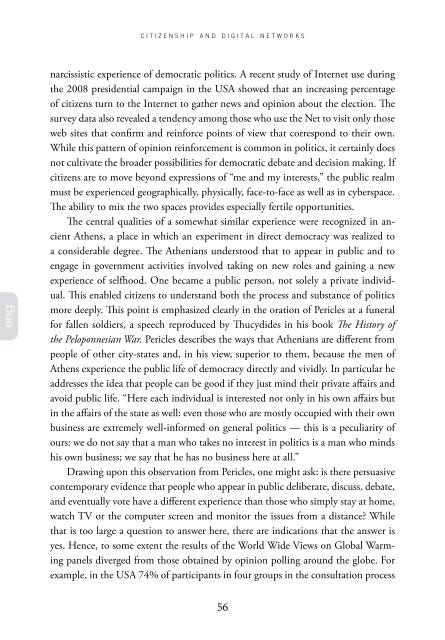Sergio Amadeu da Silveira - Cidadania e Redes Digitais
Sergio Amadeu da Silveira - Cidadania e Redes Digitais
Sergio Amadeu da Silveira - Cidadania e Redes Digitais
You also want an ePaper? Increase the reach of your titles
YUMPU automatically turns print PDFs into web optimized ePapers that Google loves.
eng<br />
c i t i z e n s h i p a n d d i g i t a l n e t w o r k s<br />
narcissistic experience of democratic politics. A recent study of Internet use during<br />
the 2008 presidential campaign in the USA showed that an increasing percentage<br />
of citizens turn to the Internet to gather news and opinion about the election. The<br />
survey <strong>da</strong>ta also revealed a tendency among those who use the Net to visit only those<br />
web sites that confirm and reinforce points of view that correspond to their own.<br />
While this pattern of opinion reinforcement is common in politics, it certainly does<br />
not cultivate the broader possibilities for democratic debate and decision making. If<br />
citizens are to move beyond expressions of “me and my interests,” the public realm<br />
must be experienced geographically, physically, face-to-face as well as in cyberspace.<br />
The ability to mix the two spaces provides especially fertile opportunities.<br />
The central qualities of a somewhat similar experience were recognized in ancient<br />
Athens, a place in which an experiment in direct democracy was realized to<br />
a considerable degree. The Athenians understood that to appear in public and to<br />
engage in government activities involved taking on new roles and gaining a new<br />
experience of selfhood. One became a public person, not solely a private individual.<br />
This enabled citizens to understand both the process and substance of politics<br />
more deeply. This point is emphasized clearly in the oration of Pericles at a funeral<br />
for fallen soldiers, a speech reproduced by Thucydides in his book The History of<br />
the Peloponnesian War. Pericles describes the ways that Athenians are different from<br />
people of other city-states and, in his view, superior to them, because the men of<br />
Athens experience the public life of democracy directly and vividly. In particular he<br />
addresses the idea that people can be good if they just mind their private affairs and<br />
avoid public life. “Here each individual is interested not only in his own affairs but<br />
in the affairs of the state as well: even those who are mostly occupied with their own<br />
business are extremely well-informed on general politics — this is a peculiarity of<br />
ours: we do not say that a man who takes no interest in politics is a man who minds<br />
his own business; we say that he has no business here at all.”<br />
Drawing upon this observation from Pericles, one might ask: is there persuasive<br />
contemporary evidence that people who appear in public deliberate, discuss, debate,<br />
and eventually vote have a different experience than those who simply stay at home,<br />
watch TV or the computer screen and monitor the issues from a distance? While<br />
that is too large a question to answer here, there are indications that the answer is<br />
yes. Hence, to some extent the results of the World Wide Views on Global Warming<br />
panels diverged from those obtained by opinion polling around the globe. For<br />
example, in the USA 74% of participants in four groups in the consultation process<br />
56


